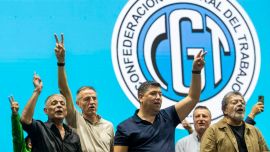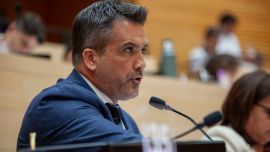Indigenous and rural Ecuadoreans blocked roads in several provinces Wednesday on the second day of protests against soaring fuel prices amid a countrywide state of emergency.
On Tuesday, 37 people were arrested and five police officers, a journalist and at least one demonstrator injured in the largest protests since conservative President Guillermo Lasso took office in May.
Protesters disrupted traffic in five of Ecuador's 24 provinces Tuesday, and vowed to continue their show of discontent with the new centre-right government's economic policies.
"The government has messed up, pushing fuel prices up all the time," protester Dennis Viteri, a 28-year-old textile worker told AFP Wednesday at Calderón, northeast of the capital Quito.
Viteri and others used soil, tree trunks and burning tires to block a portion of the Pan-American highway which connects Quito with Colombia.
As AFP looked on, more trees were being felled on a nearby hilltop with which to strengthen the barricade.
Ecuador's public safety department said there were also roadblocks Wednesday in the provinces of Imbabura, Cotopaxi, Tungurahua and Chimborazo.
Violence, hardship
Reducing fuel subsidies, which began under former president Lenín Moreno, is one way for Ecuador to shrink spending in exchange for loans from the International Monetary Fund.
But the price increases bite as Ecuador battles economic hardship worsened by the coronavirus pandemic. External debt stands at almost US$46 billion, or 45 percent of GDP.
Poverty now affects about 47 percent of Ecuadoreans and nearly a third do not have full-time work.
Teacher Fabiola Gualotuna, among the protesters in Zumbahua, said she felt let down by Lasso.
"He said he is going to raise teachers' salaries," she told AFP. "Some of us teachers travel seven or eight kilometers and earn a pittance. It is not fair."
Last Friday, Lasso announced a 12 percent increase in fuel prices, which have nearly doubled since last year – bringing the price of diesel to US$1.90 for a gallon (3.8 litres), and that of petrol to US$2.55.
Lasso vowed this would be the last increase, but could not assuage simmering anger in a country that exports oil but imports much of the fuel it consumes.
He tweeted that the protest "paralysis" meant "economic losses for small businesses, which sustain thousands of Ecuadorean families and households."
The Confederation of Indigenous Nationalities of Ecuador (Conaie), which called the protests, wants the price capped at US$1.50 for diesel and US$2 for petrol.
First day of protests
Officials said about 1,500 indigenous people, students and workers marched in Quito Tuesday, where rock-throwing protesters clashed with police who responded with tear gas.
"I came for my three children, who have been unemployed since last year. They helped me to eat and we are all suffering, we are desperate," 58-year-old Maria Elena Ponce told AFP.
"We are going to continue to a second day of mobilisation and resistance at the national level," vowed Conaie president Leonidas Iza.
The government had warned it would move to "prevent the closure of roads" to passengers and goods, and police and soldiers were deployed countrywide to monitor protesters.
By late afternoon, clashes had erupted near the cordoned-off presidential palace between rock-throwing protesters and police, who responded by firing tear gas.
Authorities said at least 37 arrests had been made, five police officers wounded and that two soldiers who were captured by protesters in an Andean village were in good health.
One young protester was injured on the forehead after being hit with a tear gas canister, according to an AFP journalist, while press freedom organisation Fundamedios said a reporter had been hit in the leg by a rubber bullet fired by police.
State of emergency
Lasso declared a 60-day state of emergency last week to tackle rising crime and violence blamed on duelling drug-traffickers in the country nestled between the world's two biggest cocaine producers: Colombia and Peru.
The state of emergency, decreed after some 240 gang-aligned inmates were killed in horrific prison clashes since January, allows for deployment of troops to help fight a crime wave that last week also claimed Ecuador's 200m sprint world bronze medalist Álex Quiñónez in a shooting in Guayaquil.
No limitations were imposed on gatherings or protests.
"We have collectively taken this decision [to protest] in the face of the new economic measures that are increasingly crushing our populations, our transport workers and our communities," protest organiser Julio Cesar Pilalumbo told AFP.
"We will resist and we will not give in to any repression," he said at a roadblock in Zumbahua in central Ecuador, where poncho-wearing women armed with spades and sticks helped men move large stones to block traffic.
On top of Ecuador's many challenges, Lasso faces a parliamentary investigation over Pandora Papers revelations that he allegedly hid millions in assets overseas.
Indigenous people represent 7.4 percent of Ecuador's 17.7 million inhabitants, and Conaie is credited with helping topple three presidents between 1997 and 2005.
related news
by Paula López & Santiago Piedra Silva, AFP






















Comments